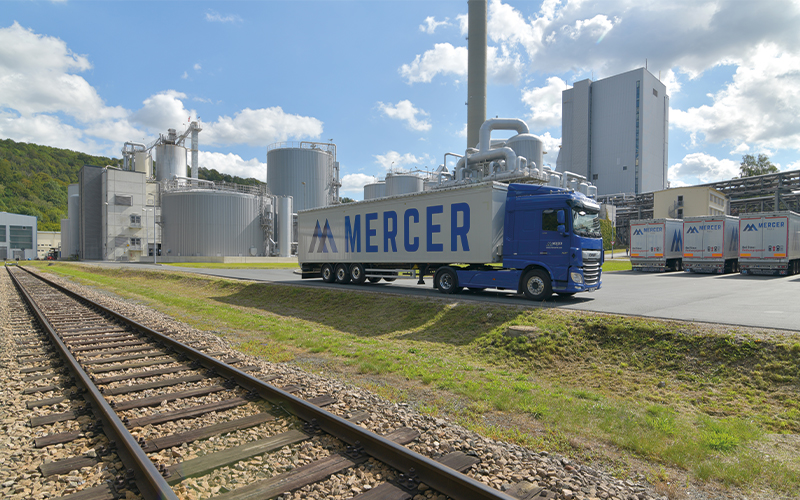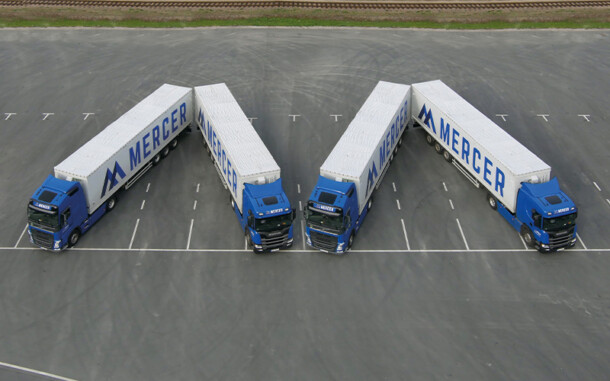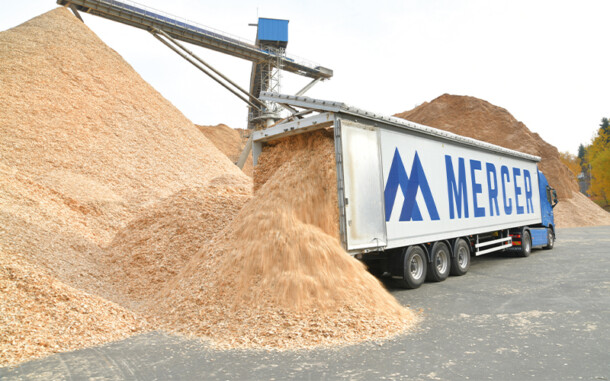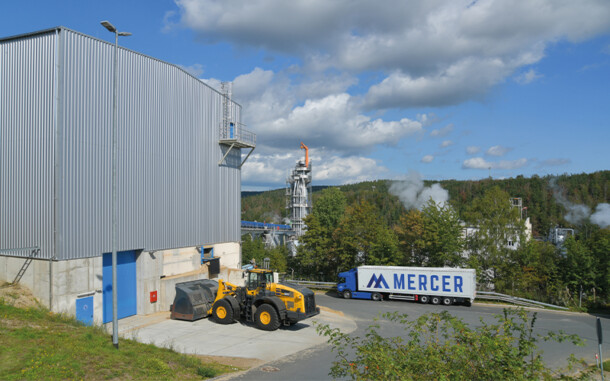
From forest to production – the digitalization of the timber industry with RampMan®
Whether as a building material, energy source, packaging material, or primary product for many branches of industry – hardly any natural raw material is more in demand and more sustainable than wood. But how does the material get from the forest to its destination? And how digital can this process become?
LoOp – Logistical Optimization of Mercer Holz GmbH
Mercer Holz is the wood purchasing organization for all of Mercer International’s German production sites. A total of 2,000 employees work at four locations. In addition to supplying the sawmills in Friesau and Torgau and the pulp mills in Rosenthal and Stendal, it offers competent timber harvesting and logistics services for third-party customers. This makes Mercer Holz GmbH a sought-after service provider for forest owners and for the wood processing industry.
Wood chips, round and sawn timber, and pulp make up the transport loads. Every day, 500 trucks and up to 15 freight trains are loaded and unloaded – a considerable amount that has to be handled at the logistics end. Mercer Holz GmbH has therefore set the clear goal of digitalizing its business processes “from the forest to the production plants”. To this end, the “LoOp – Logistical Optimization” project was launched in 2020.
“We had to understand the issue internally, analyze the problems, document the challenges, and define where we wanted to go and who we could partner with. The project became larger and larger, as it spilled over into almost all areas and directly affected several hundred colleagues,” explains Max Gewecke, Mercer Holz GmbH project manager.

LOGSOL a convincing partner
A software tool with an overview of the entire logistics chain was sought, one which would ensure transparent communication between production, logistics, and purchasing without frictional losses. In an extensive selection process, LOGSOL GmbH demonstrated convincing expertise and was able to assert itself as a reliable digitalization partner. The main objective is the introduction of the time slot management system RampMan®, including programming adjustments for interfaces, logic, and a mobile application.
“Firstly, the RampMan® approach really appealed to us and reinforced our decision to work with LOGSOL. It was clear to us that there is no ready-made product that fits our needs 100%. LOGSOL has shown not only the willingness, but also the will, to develop something new with us. And we’re confident that LOGSOL can and will make it happen. Also, the chemistry is right. We feel this is extremely important in our project team. We now think of the LOGSOL team as colleagues. The cooperation and communication are simply excellent,” says Max Gewecke, explaining the decision to go with LOGSOL.
RampMan® now also available as a mobile app
The aim of the LoOp project is to make the defined process flows more transparent and efficient. Even in its standard version, RampMan® facilitates optimal administration and booking of time slots at loading and unloading ramps, which significantly increases process transparency in general, as well as capacity utilization and availability at the “loading ramp” focal point. This in turn enables a higher throughput of deliveries.
To ensure that the software fits optimally into the system landscape and business processes of Mercer Holz GmbH, the software developers at LOGSOL GmbH are also involved. Bidirectional interfaces are to be implemented for data transfer and synchronization between the SAP system of Mercer Holz GmbH and RampMan®. In order to process master data, orders, and bookings, RampMan® is comprehensively integrated into Mercer’s IT landscape.
Another key focus is the mobile booking of time slots by the plant’s own and external drivers using a native mobile app. Key functions include determining an estimated time of arrival (ETA) at the plant, based on the remaining driving time, including traffic information from the truck, and ensuring offline availability of the app, which is a necessity especially in forested and remote areas. If a booked time slot cannot be reached due to current traffic information, e.g., delays caused by a traffic jam, an intelligent rescheduling logic comes into play, checking and implementing a possible rearrangement of the time slots based on the ETA and other limitations.
The inflow control is fully automated and adapted to the current conditions. In the event that a booked time slot is postponed, the driver is provided with all necessary information via the app. This systematic structuring and event-based adaptation makes available significantly more time slots overall, which contributes to the defined goal of optimizing the workload of the LoOp project.

An agile project on an equal footing
The development period will stretch over more than 12 months. The project was officially launched in February 2022. The design phase is taking place in parallel with software development. Mercer Holz can thus define the priorities of the work packages itself and test the implemented functions in short release cycles. In the meantime, important interfaces and functions, such as time slot notification, have already been implemented. The driver app is also taking shape and is already available with the essential interfaces. It’s a very agile project, and that’s how both partners approach it:
“We’re at a point now where we’ve defined the overall process and where we actually want to go. This allows us to move the project forward efficiently. It’s fun to see progress each week. Having LOGSOL behind it as our professional partner makes it even more gratifying to experience the way each piece of the puzzle fits into the next,” says max Gewecke, describing the collaborative progress of the project.
Franziska Pohl, LOGSOL project manager, adds: “The awareness that it’s an agile project that thrives on lively exchange is the cornerstone for successful collaboration. We consider ourselves very lucky to have won Mercer Holz GmbH as a client – one that is very solution-oriented in designing this project with us, and which also fosters an open culture of communication.”

New shared challenges
The software will be rolled out in several build stages. A pilot phase is scheduled for the first quarter of 2023. In further stages, all process participants will gradually be able to work with RampMan® and the associated apps by the third quarter of 2023. However, implementation of the work packages and successful integration of RampMan® into the IT landscape of Mercer Holz GmbH are not the only significant milestones. In October 2022, the fourth plant HIT Torgau was added to the Mercer Group.
“The fourth plant HIT Torgau will definitely also be hooked up to RampMan. But first we want to roll out all the phases for the other three plants. In the meantime, we’re thinking about how to integrate the fourth site subsequently. Other current challenges include severe limitations in raw material availability and a lack of available truck drivers. This means all of our processes must be designed as efficiently as possible and optimized accordingly. Through the implementation of RampMan®, including development of the app, we’ve already done the groundwork in this respect,” sums up Max Gewecke, project manager at Mercer Holz GmbH.